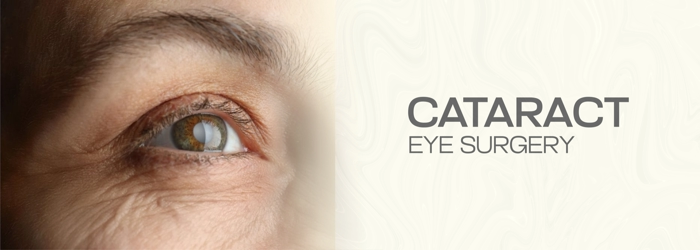
What Should You Know About Cataract Eye Surgery?
The eyes are the windows to the soul, but what happens when those windows become clouded & blurry? Smart Vision Eye Hospitals in this blog aims to provide you with comprehensive cataract eye surgery options that can help you gain clarity & knowledge towards the procedure.
Cataract is an eye condition that happens due to the clouding of the natural lens located in the eye. These generally lead to blurry vision. If left untreated, there is a good chance you might lose your vision.
Signs that Cataracts are impairing vision
- Blurry vision
- Impaired night vision
- Colours appear faded
- Sensitivity to glare & bright lights
- Halos around lights
- Double vision
According to the National Blindness & Visual Impairment Survey, cataracts are responsible for 66.2 percent of blindness causes in people over 50. The natural lens in your eyes becomes progressively cloudy. Factors such as ageing, UV radiation, medical conditions, & genetics contribute to the development of cataracts.
Cataract surgery is a quick, painless procedure to restore your vision. It is done by ophthalmologists as an outpatient treatment (i.e., you don’t have to be admitted to get the procedure done). It is very common & safe. It is more likely to be needed as you age, when cataracts are most likely to form or get worse.
Is it preventable?
While no definitive studies have proven how to prevent cataracts or slow their progression. But strategies that might be helpful to delay your cataract are:
- Regular eye examinations
- Quitting smoking
- Adopting a healthy diet rich in vitamins, minerals, & antioxidants
- Wearing sunglasses that block UVB rays when you are outdoors
- Excessive alcohol intake has been associated with an increased risk of cataracts. It is advisable to reduce alcohol intake to help minimise this risk.
Remember, preventing cataracts or halting their progression is not yet scientifically proven.
Benefits of Cataract Surgery
Improved vision:
The primary goal of any cataract surgery is to remove the cloudy lens and replace it with an artificial intraocular lens (IOL). This results in clear vision and enhanced visual acuity, allowing you to see more clearly and perform daily activities with ease.
Increased independence:
Cataracts can significantly impact activities such as driving, reading, and recognising faces. By undergoing cataract surgery, individuals are able to regain their visual abilities, enabling them to regain independence and carry out their daily tasks with greater confidence.
Clearer Colours and Sharper Contrast:
Cataracts can dull colours and reduce contrast sensitivity. It challenges the eyes to distinguish between shades and perceive details. Cataract surgery removes the cloudy lens, allowing individuals to see colours more vividly and experience sharper contrast.
Reduced dependence on glasses:
While the choice of IOL depends on many other factors, such as lifestyle and visual needs, many patients opt for multifocal lenses that can reduce dependence on glasses for distance or near vision. This freedom from glasses can improve convenience and satisfaction in daily life.
Long-lasting results:
Cataract surgery is considered a permanent solution. Once the cloudy lens is removed and replaced with an IOL, it does not require further treatment or replacement in most cases.

Are there any risks of this procedure?
Complications during and after cataract surgery are rare when performed by an experienced surgeon. Although, certain eye diseases or medical conditions may increase the risk.
Potential risks associated with cataract surgery include:
- Eye swelling or bleeding
- Continuous eye pain
- Blurred Vision or Loss of vision
- Visual disturbances, such as glares, shadows, or halos
- Displacement of the intraocular lens (IOL)
- Posterior Capsular Opacification, where the membrane holding the lens becomes cloudy after surgery
- Retinal Detachment, which occurs in approximately 2 out of 1,000 individuals
- Infection, probability of fewer than 1 in 1,000 individuals
It is very important to consult your doctor to make sure you are not prone to any such risks.
How long does it take to recover?
The recovery process typically spans around four weeks, during which individuals can expect to observe progressive improvements in their vision. However, it is common for noticeable enhancements in vision to occur within the first few days after the procedure.
Throughout this recovery period, any discomfort or pain experienced is generally minimal.
During the initial days post-surgery, individuals may encounter mild discomfort or a gritty sensation in the operated eye. However, this discomfort is usually manageable and tends to diminish rapidly as the eye heals. Pain, if present, is typically minimal and can be alleviated with prescribed or over-the-counter pain medications.
Within the first week or two, significant visual improvements become apparent. The removal of the cataract and the insertion of an artificial lens allow unobstructed passage of light, resulting in sharper and clearer vision. Colours may appear more vibrant, and contrast sensitivity often improves noticeably.
Adhering to post-operative care instructions provided by the ophthalmologist is crucial for a smooth recovery. This may involve using prescribed eye drops, avoiding strenuous activities that may strain the eyes, and attending follow-up appointments. These measures help facilitate proper healing and ensure optimal visual outcomes.
As the weeks progress, the eyes continue to heal, and vision further refines. By the end of the fourth week, most individuals achieve their maximum visual acuity and experience a full recovery from the surgery.
It is worth noting that individual recovery timelines can vary slightly, and some people may continue to notice ongoing improvements beyond the four-week mark.
In the majority of cases, cataract surgery is a well-tolerated procedure with minimal pain or discomfort throughout the recovery period.
Maintaining regular communication with your doctor and promptly reporting any concerns or unusual symptoms are crucial for a successful recovery and the attainment of the best possible visual outcome.
See the world through a clearer lens! At Smart Vision Eye Hospitals, our dedicated team is committed to helping you overcome cataracts and enjoy a life filled with clarity. Do not let cataracts dim your vision. Take a proactive step today. Click below to schedule a consultation and enjoy personalised care.
Advanced Robotic Cataract Eye Surgery Overview